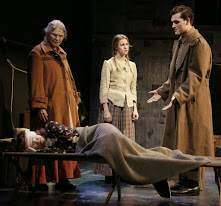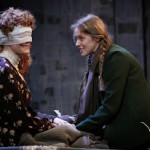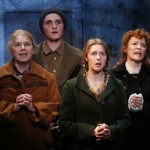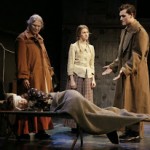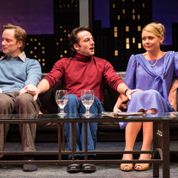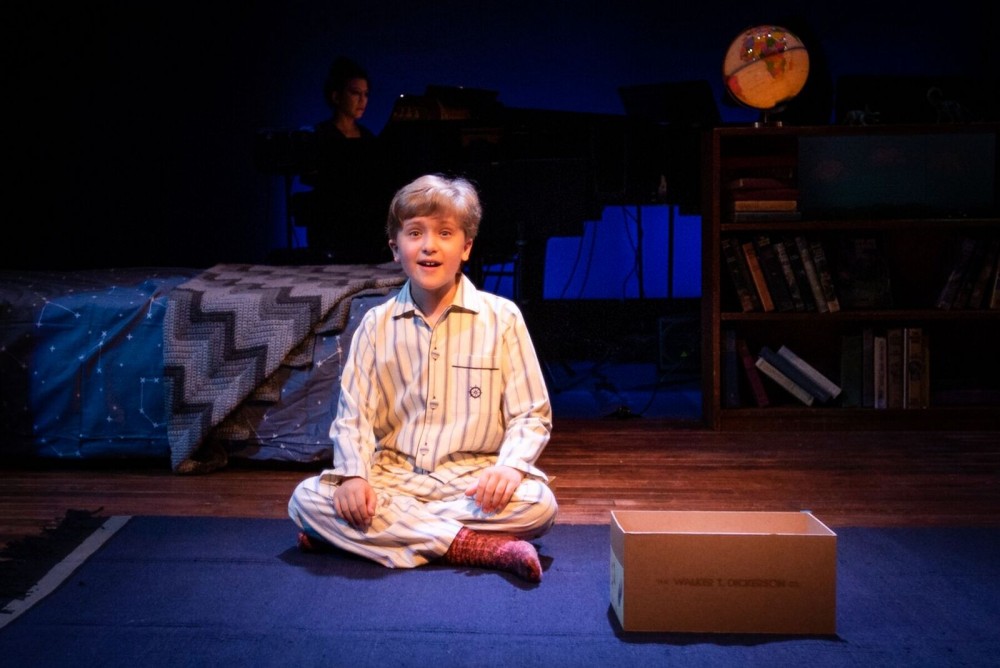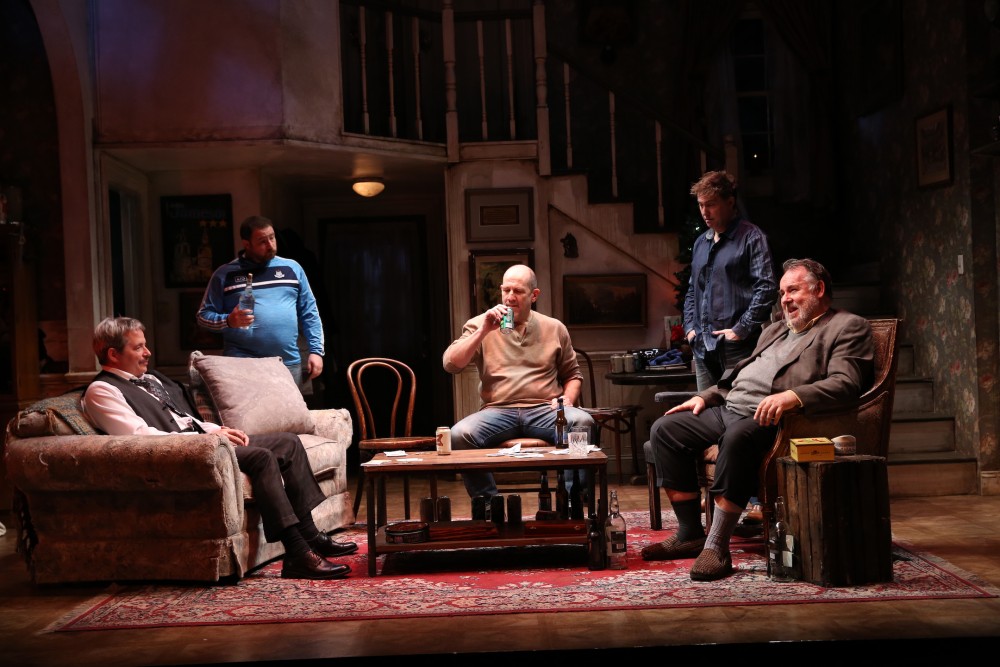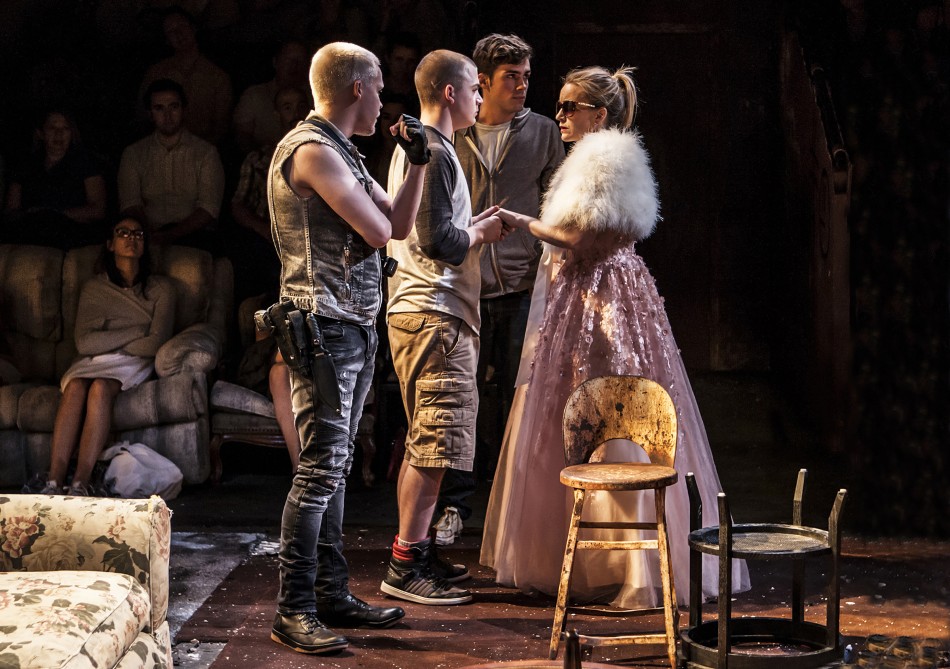(photos Carol Rosegg)
NY Theater Review by Samuel L. Leiter
Dramatizing a major historical event poses a serious dilemma for a playwright. She must find a way to explain or describe the event itself while also expressing its human impact. The problem is even more difficult when the event is little known to the general public, requiring an expository structure that provides enough information to help understand its effect on ordinary people. In SHATTER, an historically interesting but uninspired 2005 work by Canadian playwright Trina Davies, this is achieved by focusing on the microcosm of four fictional characters and how they might have responded to a horrific national tragedy; those same actors also serve as choral characters, speaking in unison and separately, at specific junctures in the text, thereby exposing the macrocosmic implications.
The catastrophe that shatters the lives of Davies’ characters is the incredible explosion that occurred in the Halifax, Nova Scotia, harbor in 1917, during the later stages of World War I. A French munitions ship, the Mont Blanc, and a Belgian relief ship, the Imo, collided, the former carrying explosives back to the European front. The devastating results of what was history’s biggest manmade blast prior to Hiroshima not only flattened most of Halifax, a busy port town of 50,000, but killed 2,000 citizens, partly or completely blinded over 300, wounded over 9,000, and drove many into homelessness.
With a set by Rebecca Phillips consisting of a rear wall with doors below and windows above, nearly all of it except the windows being plastered over with newspapers, SHATTER conveys important information via projections (created by Lucie McKinnon), many in the form of the untruthful, rabble-rousing, yellow journalism headlines of a local newspaper. Sean Hagerty’s sound design and Mary Louise Geiger’s lighting create a serviceable atmosphere for what transpires.
But Davies has chosen not to present a docudrama about this now dimly remembered accident, the story of whose investigation might have made for a more compelling theatrical experience, but to dramatize the explosion’s effect on a teenage girl, her mother, their German friend, and a young Canadian soldier on the verge of going to war. What drives the story is not so much the specifics of what happened, but how the flames of anti-German hatred were fanned by suspicions of local German complicity in the explosion.
As Davies points out in a program note, every major incident like the Halifax disaster seems to bring out the worst in the survivors, who often go on witch hunts in search of those they believe responsible, as if the need to blame and punish someone, anyone, overruled all sense of justice. Even a natural disaster like the 1923 earthquake that destroyed most of Tokyo led mobs to seek out and kill Koreans, who were believed to be using the chaotic situation to poison the wells, among other nefarious deeds. And, of course, we need only to think back to 9/11 to recall the outbreaks that singled out anyone vaguely Middle Eastern for something with which they had nothing to do.
Unfortunately, Ms. Davies’ 90-minute, intermissionless, treatment of Anna MacLean (Jackie Hansen), a pretty teenage girl; her mother, Jennie (Hollis McCarthy); their dear German friend, Elsie (Rebecca Nelson); and Brian Davidson (Michael Chris McClure), the young man who comes into their lives, is patently artificial. Brian, having entered the MacLean home while on patrol to warn the family that one of their windows isn’t blacked out, sees the diary-writing Anna and a spark is lit. Later, after the explosion, as his relationship with Anna—who’s never had a boy interested in her before—is heating up, he becomes increasingly suspicious of Elsie; she’s a German, after all, and she’s been seen writing letters down by the waterfront, so she must be a spy. The naïve Anna, hungry for Brian’s affection, buys into this idiocy. Despite her love for Elsie, Anna helps a mob destroy her furnishings. Even Jennie, so close to Elsie, who cares for her after she’s been blinded, turns on her. But Elsie, a widow whose beloved husband died five years earlier, refuses to reveal what she’s been writing. (If she had, of course, there’d be no play.) When we finally learn what it is, its romantic innocuousness only provides the final bit of lather for this soapy drama.
Susan Fenichell’s direction lacks the creative imagination that might have made even this problematic script come alive, the way Joe Tantalo’s does for the much sparer production of DELIVERANCE at 59E59. And none of the actors is sufficiently grounded in their characters to offer more than surface portrayals. SHATTER is interesting mainly as a reminder of a significant accident and of the irrational forces such things can unleash in ordinary people. As a play and production, it’s anything but shattering.
Urban Stages 259 W. 30th Street Through November 16


